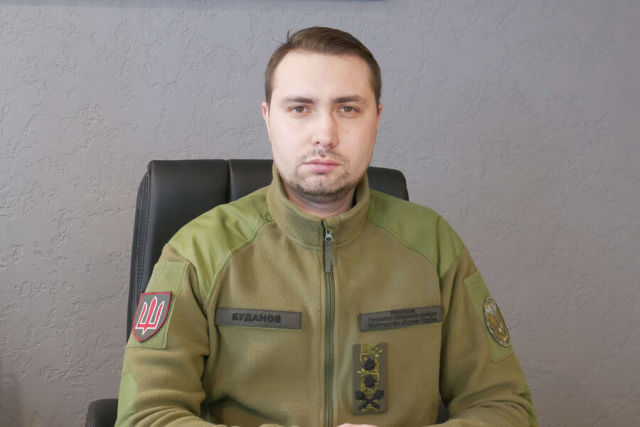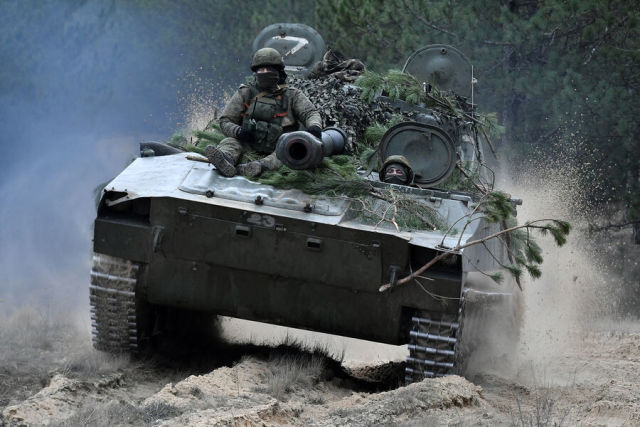The head of intelligence of the Ministry of Defense of Ukraine Budanov said that the conflict with Russia has reached an impasse The head of the Main Intelligence Directorate of the Ministry of Defense of Ukraine, Kirill Budanov, said that the military conflict in Ukraine has reached an impasse, since neither Kiev nor Moscow can achieve significant success.
Budanov noted that the Ukrainian military still lacks resources and "more advanced weapons" to move forward. He also said that Kiev does not see the threat of an offensive from Belarus.
The fighting in Ukraine has reached an impasse, Kirill Budanov, head of the Main Intelligence Directorate of the Ministry of Defense of Ukraine, said in an interview with the BBC. According to him, Kiev cannot defeat Russia in all directions and expects the supply of new weapons from Western countries.
The BBC notes that the fiercest fighting unfolded around Bakhmut (the Russian name is Artemovsk), and winter slowed down the pace of Ukraine's ground operations. On December 27-28, Budanov visited the positions of the AFU in Bakhmut. There he looked at the work of the special Forces scouts and listened to the reports of the unit commanders.
In an interview, Budanov admitted that the Ukrainian forces still lack the resources to move forward in many areas.

Image source: gur.gov.ua
He also expressed hope that Ukraine will eventually return to the borders of 1991.
About the threat from Belarus
Earlier in December, some Ukrainian officials claimed that Russia could organize a ground offensive of its troops from the territory of Belarus in early 2023. According to them, the attack may include a second attempt to capture Kiev. Russia has rejected such statements by Ukrainian politicians.
Russian Deputy Foreign Minister Mikhail Galuzin in an interview with RIA Novosti called the discussion of the potential participation of a joint group of troops of Russia and Belarus in military operations in Ukraine "incorrect". According to Galuzin, the task of this group is "to repel a potential enemy if necessary" in the event of his invasion of Belarusian territory.
The head of Ukrainian intelligence said that at the moment he does not see a real, immediate threat of an offensive from Belarus.
He also expressed the opinion that the Belarusian society will not support participation in the conflict in Ukraine.
"Therefore, President [of Belarus Alexander] Lukashenko is taking all steps to prevent a catastrophe for his country," Budanov believes.
In Washington, they prepared for a deadlock
The course of military operations in Ukraine is likely to change in the near future - Russia will strengthen its defense in the occupied territories, and it will become more difficult for Ukraine to attack, The New York Times writes, citing its sources in the US government and military experts.
According to the NYT, the most likely scenario for the second year of the conflict is a stalemate, when none of the armies can capture large territories.
"I really think it's much easier for Ukraine to defend territory than to go on the offensive to regain territory," said Evelyn Farkas, a former senior Pentagon official and Russia expert.
NYT sources also believe that Ukraine will most likely not send its compounds to Crimea. Instead, Kiev will continue to shell the military infrastructure of the peninsula and carry out sabotage, such as blowing up the Crimean Bridge, the interlocutors of the publication specify. According to them, the Ukrainian authorities believe that it is extremely important to shackle Russian forces in Crimea. According to experts, Ukraine's main attention will be focused on the south.
According to the publication, the AFU continues to look for weaknesses in the defense of the Russian army with the help of American intelligence data. However, only modest victories can be won in this way now, the newspaper's interlocutors believe.
"Small breakthroughs by Ukrainian forces in the next few months are unlikely to lead to a large-scale defeat of the Russian army, officials in Washington say. But Russia is also unlikely to achieve serious breakthroughs," writes the NYT.
The newspaper also drew attention to the fact that the commander of the united group of troops, Sergei Surovikin, "conducts complex military operations more effectively." The NYT also writes that the appearance of 300,000 mobilized troops will also strengthen Russia's position. In the US, it is believed that by the spring these units can become a serious military force.
The authors of the NYT point out that the course of hostilities now increasingly depends on the ammunition available to each side.
"This is increasingly becoming a rivalry between the Western industrial base and the Russian industrial base with some help from the Iranians, North Koreans and some other countries," says Seth Jones, senior vice president of the Center for Strategic and International Studies.
At the same time, the newspaper points out that for most of the year Ukraine produced "much more artillery shells in a week than the United States could produce in a month." It follows from the report of the National Bank of Ukraine that the amount of military, humanitarian and financial assistance to Kiev from partner countries in 2022 exceeded $120 billion.
Alice Andreeva

